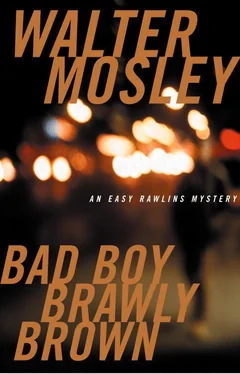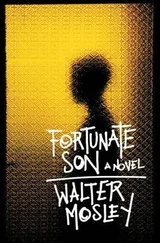“He was being belligerent with Doris.”
“Did you frisk him?”
Again Hal Gellman searched for words that did not exist.
Looking back and forth between those two, I began to have heart that change was possible in my lifetime. My enemies were both blind and small-minded, vain and unable to imagine me even though I was standing right there in front of them.
The nameless secretary pressed a button on a walnut box that sat on her desk.
A man’s voice said, “Yes, Mona?”
“Ezekiel Porterhouse Rawlins came to the front door, and Sergeant Gellman brought him here. What should I do?”
Small-minded, maybe, but they did their homework.
A silence followed Mona’s question. Hal stared at the wall above her head.
His glare and his situation reminded me of my father.
My father disappeared forty-two days after my eighth birthday. He went out to work at a lumberjack camp and never returned. I have very few memories of him, but what I do remember is cast in bronze.
He once told me that anything that happened to a man before he was sixty was a good thing.
“Not everything,” I said, testing my own childish knowledge against his.
“Yes,” he said, “everything.”
“Uh-uh, not if you get your arm cut off.”
“Even if you’re right-handed and you get your right arm cut off,” he said. “Even that will turn out to be a good thing if you’re a real man.”
“But how?”
“Because a real man will know that he has to overcome anything that gets in the way of him caring for his family. A real man will study the arm he has left. He will build its strength, learn how to use tools with it. He will make sure that he’s a better man with one arm than other men are with two. And he’ll make it so, no matter how hard he has to try. A real man can be beat only if you kill him. And with his dyin’ breath he will try to overcome Death itself.”
Standing there between those bickering police, I thought of my father and of Raymond Alexander, who never feared Death or her emissaries. Hal Gellman was being given a chance, though he probably didn’t realize it. The deep-voiced Mona was helping him to see something. His boss’s silence was telling him something.
I saw no awareness in his angry glare, though. That was my lesson.
The beech door behind Mona opened and a tall man, about my age, walked into the room. He wore a cheap dark suit with a white shirt and no tie. His shoulders were narrow and his gaze, behind the round wire-rimmed glasses, was intense.
“Rawlins?” he said.
I nodded.
He looked me up and down, decided by some unknown calculations that I wasn’t a threat, and said, “Colonel Lakeland. Come with me.”
He turned and walked back through the buff doorway.
As I followed I experienced a familiar feeling of elation. It’s a reaction that black people often have when going into the slave master’s quarters. In there, we imagine, is the place where freedom resides. And if we get the chance, maybe we could pick up a little of that most precious commodity when the man is otherwise occupied.
I smiled at my silly delight.
Mona mistook my smile as being for her. She sneered at me and I was jarred back to reality.
Lakeland’s office consisted of a large space with a broad desk dead center. There were a dozen chairs or so at various attitudes around the room. A powerful lamp hung maybe five feet above the desktop, illuminating the counter-sized work area and leaving the rest of the office in a kind of twilight. The room smelled heavily of cigarette smoke. That was when I felt my first real twinge of withdrawal.
I noticed that there were half a dozen or so diplomas in frames hanging on the wall near the door. A bachelor of arts from UCLA, a master’s degree from Caltech. I didn’t have time to make out the other degrees but I was sure that Colonel Lakeland was the recipient of each parchment.
“Sit,” Lakeland said as he made his way to a plush swivel chair.
I took a seat off to the left, not wanting to make it seem that I was the subject of our discussion. I was just another one of the guys, sitting on the edge of the project.
The nameplate before me read lt. l. lakeland. I just glanced at it and he said, “I’m a colonel in the army. I was tapped by city hall and Sacramento to run this operation.”
“Intelligence?” I asked.
I guess he heard the sarcasm in my question, and that’s why he passed it over.
“What are you doing here, Rawlins?”
“I could ask you that same question, Colonel.”
Lakeland’s face was also narrow. His lips seemed to belong on a corpse, they were so leathery and thin. His grin was a disgusting show.
“The Seventy-seventh Precinct captain thinks that you might be our man,” he said.
“Your man for what?”
“Didn’t Knorr tell you?”
“He said something about an insurrection. Sounded pretty crazy to me.”
“It’s not,” Lakeland assured me. “They’re stockpiling guns, shadowing the police.”
“With the police following them,” I added.
“It’s our job to ensure the safety of the people, Rawlins. That’s what they pay us for.”
“What’s that got to do with me?”
“Knorr offered you a job, did he not?”
“I’m no rat, Lieutenant,” I said.
“Colonel.”
“I’m speaking to the cop wants me to be a stool for him.”
Lakeland considered me. I presented a problem. I knew what he was doing and where he was doing it from. But then again, I had come into his lair, unafraid.
“What do you want, Rawlins?”
“Brawly Brown.”
“Again?”
“I got a friend named John. He’s got a close friend named Alva. Brawly is Alva’s son. He’s a bullheaded young man but not bad as far as I’ve been told and as far as I could see. What I want is to pull him out of any trouble he’s in with you and try to get him back home.”
“What do I get in return?”
“I don’t know.”
Those dead lips grinned again.
“Not a very good trade, now, is it?” he said.
“As far as I’m concerned, Brawly and me are innocent bystanders,” I said. “Just two black men in the wrong place at the wrong time. If I see something I think you need to know, I’ll tell you about it. I won’t be a rat for you but if we have some interest in common, I might let something drop in your lap.”
“I need more convincing than that,” Lakeland said.
“You won’t be gettin’ it from me, man. Listen, if I heard that there’s going to be some ambush or bombin’, I’d tell you in a minute, especially if innocent black people are about to get killed. All I’m askin’ you for is Brawly.”
Lakeland let his head loll to the side, to take me in from another angle.
“We could pay you...”
“You could...,” I said, and then I experienced a moment of dizziness. I was just then realizing how far I’d climbed into that lion’s den. I had taken steps, one after the other, without any real regard to my destination. I was speaking to a man who could have me killed, a man who was my enemy and my people’s enemy. But there was no turning away. “But I’m here for only one reason, to get Brawly home.”
“And what do I have to do with that?”
“I need some information.”
“What kind of information?”
“Addresses for Christina Montes and Jasper Bodan, president and secretary of the Urban Revolutionary Party.” I waited for a reply but none came. So I continued. “And some idea of what you have on Brawly.”
“I ask you again, Mr. Rawlins. What will you do for me?”
“You’ve read my files, man. And you know how deep I can get into a situation just seein’ me sit in front’a you. It wouldn’t hurt you to have me worried about some conflagration. I mean, if the man you got in there now isn’t doin’ the job so you need another source.”
Читать дальше












